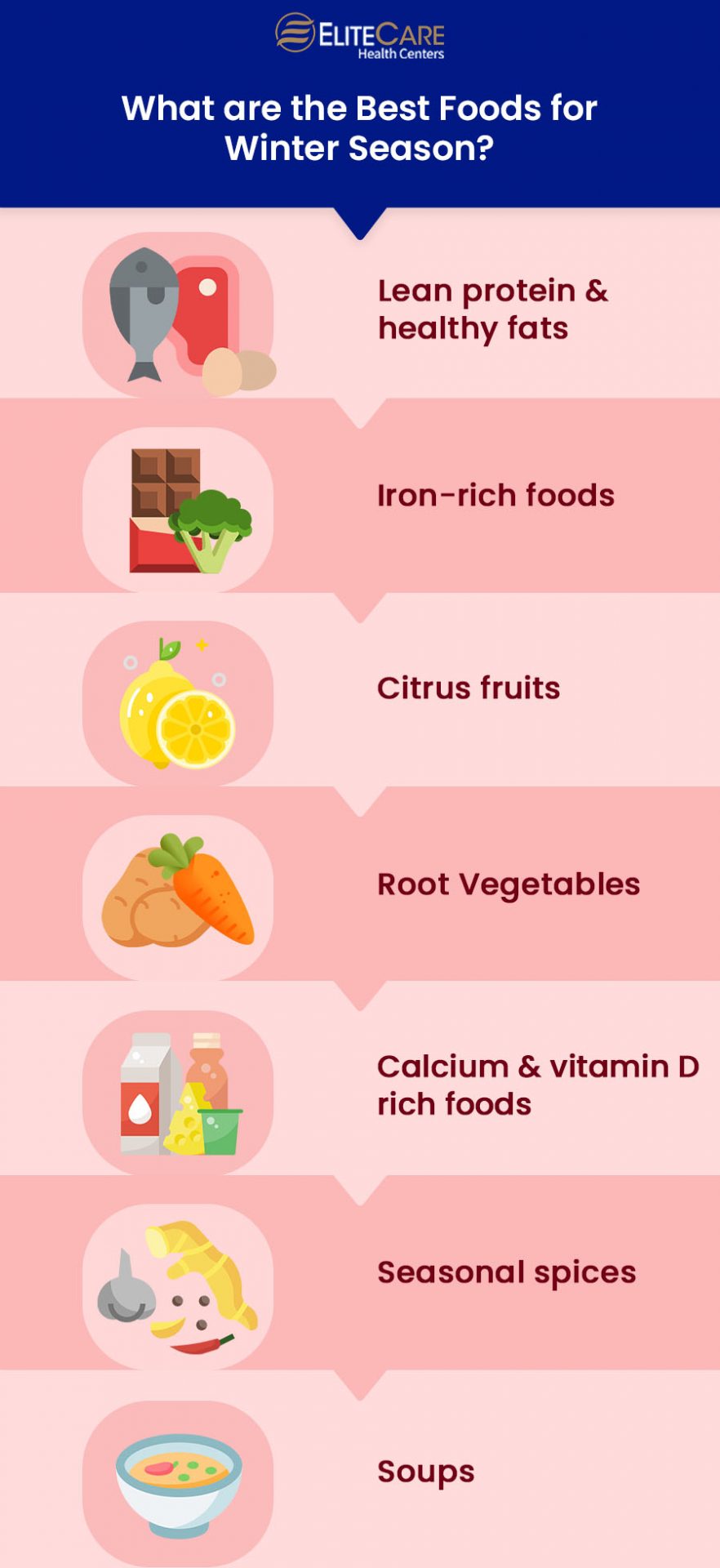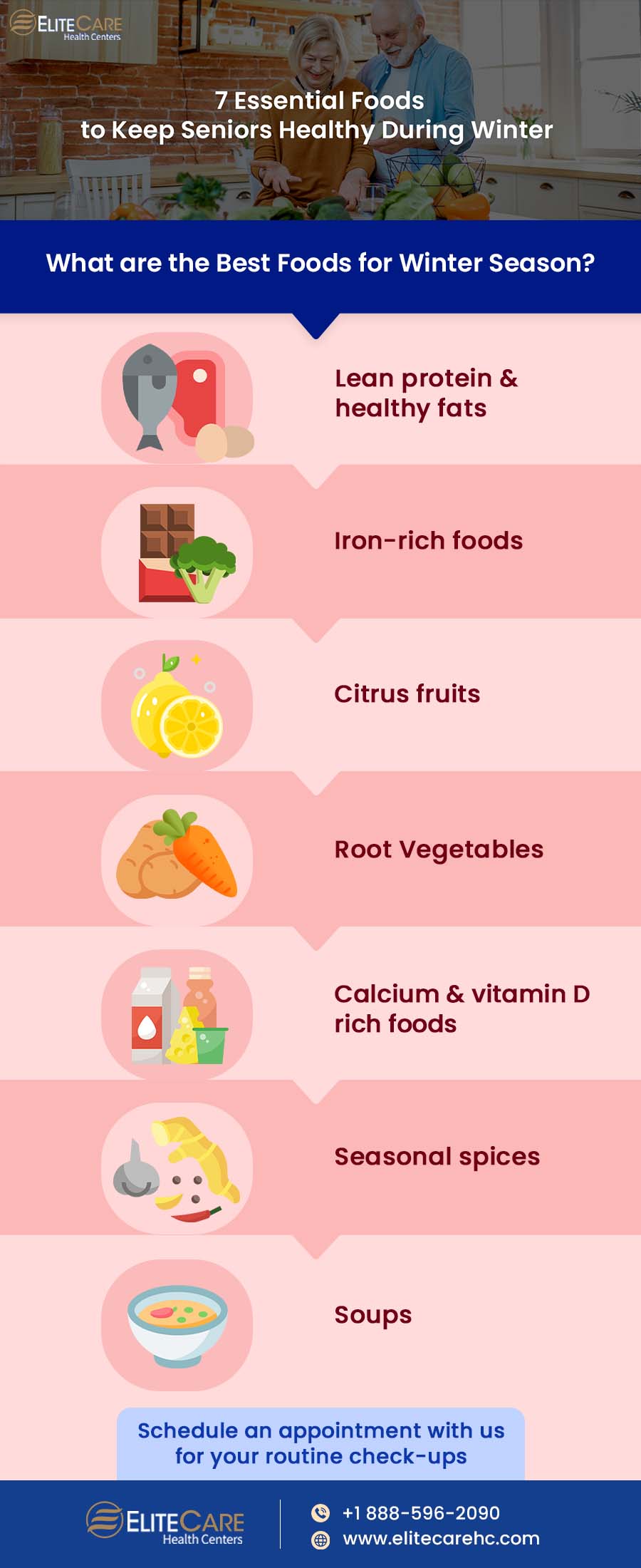
As winter approaches and temperatures drop, seniors may experience several health issues like respiratory discomfort, flu, etc. due to temperature imbalance in their bodies triggered by the cold weather. Therefore, it is crucial to ensure seniors stay warm and comfortable during this time. A good diet is also essential to keep seniors healthy and deal with any potential hinders. Here are a few specific diet recommendations for seniors during winter.
Why Do Seniors Require Diet Changes in Winter?
Lack of tolerance for extreme heat or cold is an inevitable part of the aging process. This means the key components that regulate body temperatures, such as body fat percentage, muscle mass, skin, and sweat glands, change with age. Thus, these changes influence thermoregulation (thermal regulation), or how the body maintains its temperature balance. Poor thermoregulation can be related to a number of organ or system impairments as the body has to work harder. The only way to solve this issue is to follow a few safety tips for winter and eat the right foods in winter.
In addition, seniors often require diet changes in winter because their bodies may be more vulnerable to the flu and cold. Eating a nutrient-rich diet with foods high in vitamins and minerals can help strengthen the immune system. Additionally, seniors have a slow metabolic rate and for this reason, they may eat smaller portions. Hence, it is important to include nutrient-dense foods to ensure they are getting adequate nutrition.
Read More: 6 Facts You Must Know about the Flu Vaccine
What are the Best Foods for the Winter Season?

1. Lean protein and healthy fats
Seniors need lean protein and healthy fats in their winter diet for a variety of reasons. Healthy fats provide essential fatty acids and keep the immune system functioning at its optimal level. This is especially critical during the winter months when colds and the flu are more common. Eating lean protein and healthy fats can also help seniors maintain a healthy weight and can provide energy throughout the day.
Common sources of lean protein and healthy fats: fish, skinless poultry, tofu, eggs, nuts, seeds, legumes, olive oil, avocados, nuts and seeds, fatty fish such as salmon and sardines, etc.
Read More: Foods That Help Lower Blood Pressure | EliteCare HC
2. Iron-rich foods
Acute respiratory distress syndrome (ARDS) occurs when the lungs are not able to supply enough oxygen to the body’s vital organs. In winter, health conditions like ARDS are more common among seniors. Related conditions like pneumonia, the flu, or chest injuries can also increase the risk of inflammation in the lungs.
Iron is an invaluable nutrient that helps to increase the production of red blood cells, which carry oxygen throughout the body. Therefore, it can significantly reduce the risk of these health conditions in winter.
Common sources of iron: broccoli, dark chocolate, turkey or chicken, legumes, liver and other organ meats, pumpkin seeds, shellfish and fish, tofu, quinoa, etc.
3. Vitamin C-rich foods
During winter, older adults are more susceptible to infection. In this season, poor temperature control or conditions like gastrointestinal infection can especially increase the risk of other related health concerns. Vitamin C and antioxidant-rich foods are healthy additions to winter diets to keep colds and flu at bay. These fruits are effective at reducing inflammation in the body and fight infections and viruses by strengthening immunity.
Besides, oranges, grapefruit, pineapple, and several other citrus fruits are in season during the winter months. Therefore, they are fresher, naturally ripe, and available at the best prices.
Common sources of vitamin C: cabbage, lemon, lime, grapefruit, kiwi, orange, pineapple, kale, potato, sweet potato, yams, etc.
4. Root vegetables
Winter is the peak season for root vegetables, and they are known to be some of the most nutrient-rich vegetables with numerous health benefits. Root vegetables are high in vitamins A, B, and C as well as iron. Additionally, they are high in fiber and slow-burning carbohydrates, making them a nutritious addition to the winter diet to restore energy.
Besides, root vegetables are hearty and store well at cold temperatures, making them a convenient and dependable food source during the winter months. They are also versatile and bring exceptional flavors and colors to the palate.
Common root vegetables: carrot, potato, turnip, beet, parsnip, sweet potato, etc.
5. Vitamin D & calcium-rich foods
Adequate intake of calcium is essential to strengthening bones and muscles to avoid bone loss, risk of falls, and weakened immunity in seniors. In addition, vitamin D is also required for the absorption of calcium in the body. Winter means decreased exposure to sunlight which is the main source of vitamin D. Seniors need to have more vitamin D and calcium-rich foods in winter because they are more likely to suffer from a lack of vitamin D in winter.
Common sources of calcium and vitamin D: milk, cheese, yogurt, tofu, sardines, salmon, almonds, sunflower seeds, soybeans, leafy greens like broccoli, kale, spinach, mustard greens, etc.
6. Seasonal spices
Adding seasonal spices to food in the winter has many health benefits for seniors. Warming spices such as cinnamon, nutmeg, ginger, and cloves can improve digestion, reduce inflammation, and boost immunity. These spices also contain antioxidants that can help protect against colds and other illnesses. Additionally, they can add flavor and variety to a winter diet, making food more enjoyable.
Furthermore, having spicy foods can also help in winter because they contain compounds like capsaicin that can help increase blood circulation which can help to keep the body warm.
Spices to have in winter: ginger, garlic, cinnamon, cardamom, cloves, turmeric, nutmeg, etc.
7. Soups
Having soups in the winter can help seniors stay warm and hydrated. It is easy to incorporate multiple nutrient-rich ingredients into soups and thus, they can be a rich source of essential vitamins, minerals, and other nutrients that can help seniors stay healthy. Besides, soups are generally easier to digest than other foods, which can be beneficial for seniors who may have digestive issues during winter.
Common nutrient-rich soups: creamy mushroom soup, carrot and ginger soup, potato and leek soup, butternut squash soup, split pea soup, chicken and rice soup, tomato soup, vegetable beef soup, etc.
Key Takeaway
It’s essential for seniors to make sure they are consuming these seven essential foods during the winter season to stay healthy and strong during the cold months. In addition, they should avoid processed and sugary foods and beverages. Also, seniors must drink adequate water to stay hydrated and get enough rest to allow their bodies to fight off any illnesses or viruses this winter season. Always consult a dietitian before opting for a new diet plan and inform them about any allergies or digestion issues seniors may have. Book an appointment with EliteCare Health Centers to consult our board-certified physicians and make sure the senior members of your family enjoy a healthy winter season this year!






